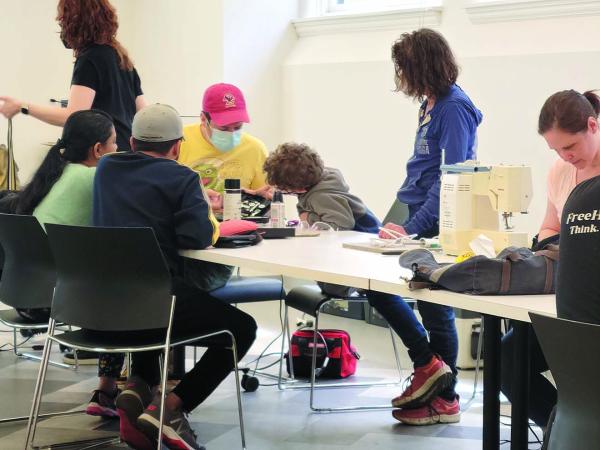May 18, 2023

Jonathan Krones, center in hat, helped to repair damaged items at a Fix-It Clinic held at the Jamaica Plain Branch of the Boston Public Library last month. Photo by Sarah Freeman
When you re-read a book, the ending never changes, but this summer, Dorchester residents will have the opportunity to rewrite the story of time-challenged clocks, toasters, and toys, with volunteer help amid the shelves of romance, thrillers, and sci-fi novels at local libraries.
Members of the community have been invited to bring damaged items to the first of three local ‘Fix-It’ clinics on Sat., May 27, from 10 a.m. to 1 p.m. at the Fields Corner branch of the Boston Public Library, where they can work collaboratively with coaches to repair them for free.
The two other workshops are scheduled for the same hour on Sat., June 24, at the library in Grove Hall and Sat., Aug. 26, at the Lower Mills library branch.
The events are aimed at promoting Zero Waste Boston, the city’s effort to reduce trash and promote recycling. Fix-It coach and clinic organizer Jonathan Krones hopes the programs will inspire neighbors to improve their waste management and move away from disposable society status.
“We are prioritizing the experience of when something is broken developing the confidence to say, ‘Okay, let’s try to diagnose what’s wrong with this,’” said Krones, who teaches at Boston College and specializes in the study of sustainable materials.
“Let’s look around, see how we can open it up, and once it’s open, try to figure out what is going wrong and develop a plan for fixing it.”
The clinics will be staffed by volunteers (45 Bostonians who have signed up to be coaches), most of whom work professionally in various trades while others have a passion for restoring damaged materials and choose to dedicate their personal time to better the neighborhood.
Broken items can include but are not limited to jewelry, toys, bikes, and electronics. And since the clinics are volunteer-run, participants must bring in items themselves, which means that larger appliances like refrigerators and washing machines are not part of the program.
Even if coaches may not know how to fix items on the spot, they will work with participants to find a solution together. This is how Krones approached fixing a toaster earlier in his career.
“I didn’t really understand how a toaster worked, even though I was, quote unquote, the coach. I was learning about the electromagnetic mechanism that holds the plunger down. We were all learning together,” he said.
And while some might attend a clinic for the chance to get a free repair, Krones said the motivating idea behind the clinics is to change our mindset about household items that might otherwise get tossed in the trash.
“This is the mentality that you’re going to have to learn some skills to learn how to repair your items. This isn’t just like free repair service. This is about building a culture of repair in our community,” he said.
While it may be hard to measure the actual change in the mass of trash in the city, Krones is confident that these events will be successful in encouraging community members to manage their materials and keep repairability in mind.
When it comes to repair, it is not the skill that residents lack, but rather the confidence, he said. Coaches hope that by working with residents, they can pump up their ability to fix items rather than dispose of them.
“Everybody uses stuff, everybody’s stuff breaks,” said Krones. “And people have skills from their whole lives that they can bring to bear on these tasks. And it’s such a great experience getting to work together to bring things that people value back to life.”
Even though the community repair events are full of diligent volunteers who repair around 50 percent of the items, some objects are essentially unfixable. This is not a failure, said Krones.
“Even if the repair attempt ends up being unsuccessful, it’s a fun couple of hours to spend with your neighbors, making an impact on waste and on climate building connections and, hopefully, building some momentum toward the development of a nice culture of repair here in Boston,” he said.



